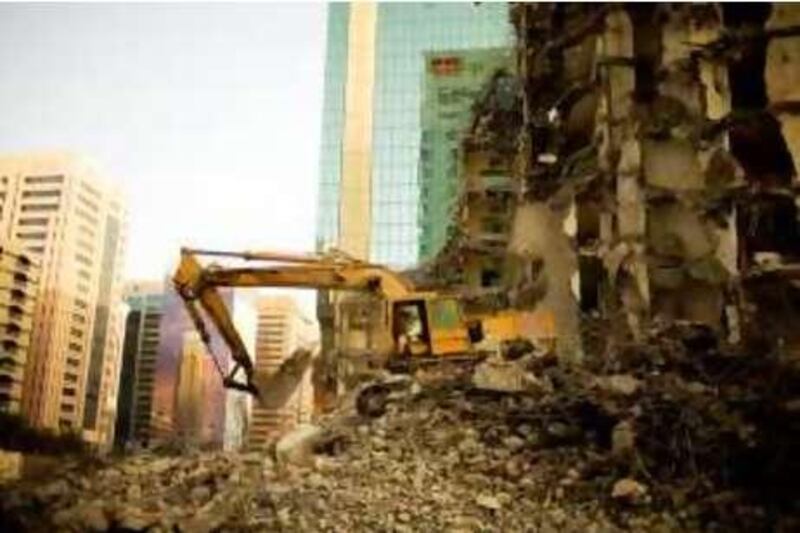ABU DHABI // They may make the difference between life and death on building sites: hard hats, harnesses and other safety equipment. But lapses are occurring while towers sprout throughout Abu Dhabi, as photographs taken by a reader of The National - and by the newspaper itself - show. The Executive Council is considering new laws for improved regulations on building sites, targeting companies that skirt safety rules and threatening harsher penalties.
In photographs presented to officials, workers are captured moving precariously close to the edge of a highy-rise support column of an unfinished building. "These people, what they are doing is wrong," said Khalfan al Nuaimi, the director of construction permits for Abu Dhabi Municipality. "Each contractor has their own safety guidelines and the workers have to wear helmets under the law. What I see here is not legal according to the safety procedures."
Ibrahim Baqer, chairman of the Health, Safety and Environment (HSE) committee, said a draft law included plans to increase the number of inspectors responsible for monitoring building site safety standards. At present there are only five full-time inspectors in an emirate with about 3,500 building projects under way. The number could rise to 65 under the new law. The HSE committee does not record the numbers killed or injured in building site accidents and, under the existing regulations, there are no requirements for companies to report injuries to authorities. This is expected to change when the new system is introduced.
The HSE committee is expected to become the emirate's construction regulatory authority next June, pending the Executive Council's decision to implement the law. Currently the committee, which operates under the Department of Municipal Affairs (DMA), is not an enforcement body and can only encourage the public to report sites with lax safety standards. "For the time being, we just do awareness and encouraging the companies, but we cannot enforce the rules," Mr Baqer said.
His announcement came as municipal officials pledged to investigate why a building site worker was captured on camera by a reader of The National without harnesses or hard hat. Mr Nuaimi said he was taking the evidence seriously, and asked for the details of the contracting company so that he could send a safety inspector to the site. Building workers have been known to ignore safety guidelines regarding helmets because of the heat, he said. However, responsibility for enforcing safety guidelines ultimately rested with the companies.
"Because they are professionals, you know sometimes they are hot and they don't want to put the helmets on," he said. "If anything happens to them, then the company will be in trouble and go to court. They are responsible." Contacted by The National several times, the consulting firm for the building declined to comment. An official working with the safety inspectors said the building crews themselves often acted recklessly.
"Sometimes it's the workers," said the official. "The employees go without safety equipment and I lecture them. Do they want to kill themselves?" Inspectors can shut down building sites, depending on the level of danger. "We will stop the work partially or entirely if it is putting people in harm," Mr Baqer said. "If the company does not rectify the situation, they might be subject to other punishments, such as fines or imprisonment. So far we haven't faced any contractors who didn't respond, so we haven't used the enforcement procedures."
In the past, municipal courts have fined companies Dh5,000 (US$1,360) for safety violations, he added. Under the draft law, penalties could rise to Dh500,000, although that is still under review. Fires al Youssef, the HSE superintendent, said building firms operated under a mix of standards from Britain, the US and Australia. But major companies were collaborating with the DMA to put updated UAE-specific regulations in place by next year.
Companies that breach health and safety guidelines have 28 days to comply with proper procedures or stop work. The contractor has one week to correct high-risk breaches; failure to do so would lead to the municipality's courts, which can impose fines. Building companies or workers found in breach of safety procedures can be reported to the HSE by telephoning 02 695 7417. mkwong@thenational.ae






